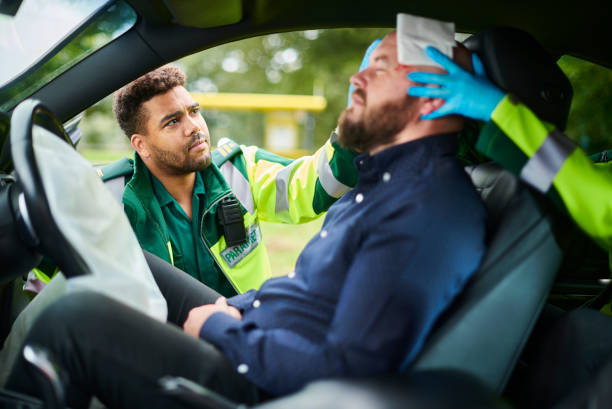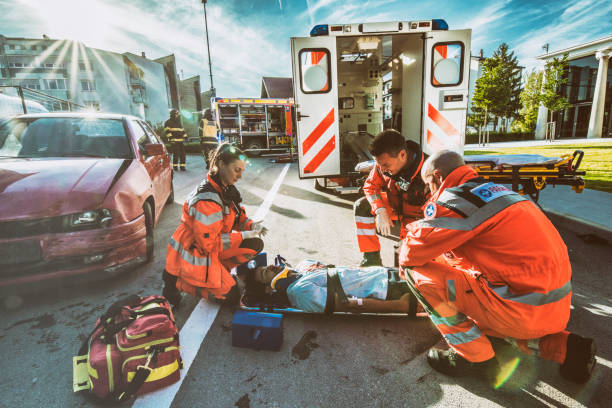Car Accident Pain Relief: Expert Advice and Tips
Car accidents can be traumatic experiences, leaving victims with physical and emotional pain long after the incident.
For motorists and fitness enthusiasts who have been involved in a car accident, the journey to recovery can be challenging. However, by implementing effective pain management strategies, individuals can optimize their recovery and regain a sense of normalcy.
Understanding the impact of a car accident on the body is crucial for devising an appropriate pain management plan. Injuries sustained during car accidents can vary widely, ranging from minor bruises and sprains to more severe conditions such as whiplash, back injuries, and fractures.
Regardless of the nature of the injury, seeking prompt medical attention is essential. Consulting with a healthcare professional will help determine the extent of the injury, informing the formulation of your personalized pain management plan.
But before we delve into time-tested pain management tips after an accident, let’s explore the most prevalent types of car accidents.

The Commonest Car Accidents You Should Know
As a motorist, below are the commonest car accident injuries that both groups should be aware of:
Whiplash
Whiplash is one of the most well-known car accident injuries and can affect motorists and fitness enthusiasts alike. This injury occurs when the head is suddenly jerked forward and then snapped back, causing damage to the soft tissues of the neck.
Symptoms of whiplash include neck pain, stiffness, headaches, and dizziness. For fitness enthusiasts, this injury can be particularly problematic, as it may impact their ability to engage in physical activities until they have fully recovered.
Broken Bones
Another common car accident injury is broken bones. Fractures can occur in various parts of the body, such as the arms, legs, ribs, and pelvis, due to the impact of a car accident.
These injuries can be particularly debilitating for both motorists, as they may hinder mobility and the ability to participate in physical activities.
Traumatic Brain Injuries
Traumatic brain injuries (TBIs) are also a significant concern in car accidents. TBIs can range from mild concussions to severe brain damage, and they can have long-term effects on an individual’s cognitive and physical abilities.
For fitness enthusiasts, a TBI can be especially devastating, as it may impact their ability to engage in physical exercise and lead an active lifestyle.
Spinal Cord Injuries
Spinal cord injuries are another serious consequence of car accidents. Damage to the spinal cord can lead to paralysis, loss of sensation, and impaired bodily functions.
Both motorists may face significant challenges if they sustain a spinal cord injury, as it can profoundly impact their ability to drive, exercise, and maintain overall physical health.
Soft Tissue Injuries
Soft tissue injuries, such as sprains and strains, are also commonly experienced in car accidents.
These injuries can lead to pain, swelling, and reduced flexibility, making it difficult for individuals to participate in physical activities and maintain their fitness routines.

6 Top Strategies for Managing Car Accident Pain
Whether you are a passionate driver or a fitness enthusiast who enjoys an active lifestyle, dealing with the aftermath of a car accident can significantly impact your physical and mental well-being.
Below are the most effective pain management tips specifically tailored to help motorists optimize their recovery process after an accident.
1. Seek Immediate Medical Attention
Following a car accident, it is crucial to seek immediate medical attention, even if you do not exhibit any visible injuries.
Many injuries sustained in car accidents, such as whiplash and soft tissue damage, may not manifest symptoms right away.
A thorough medical evaluation by a healthcare professional can help identify and address any underlying issues, ensuring that you receive the necessary treatment to prevent long-term complications.
2. Embrace Physical Therapy and Exercise
As a fitness enthusiast accustomed to an active lifestyle, the prospect of being sidelined due to car accident injuries can be particularly challenging.
Engaging in physical therapy under the guidance of a qualified professional can facilitate a safe and effective recovery process. Additionally, integrating gentle exercises and stretches recommended by healthcare providers can aid in maintaining mobility and preventing muscle stiffness.
3. Explore Non-Invasive Pain Management Techniques
Managing pain is paramount to facilitating a smooth recovery after a car accident.
For motorists seeking alternative pain management strategies, non-invasive techniques such as acupuncture, chiropractic care, and massage therapy can provide relief from discomfort and aid in restoring overall well-being. These holistic approaches can complement traditional medical interventions to address pain and improve recovery outcomes.
4. Practice Mindfulness and Stress Management
The emotional toll of a car accident can be as challenging as the physical injuries incurred.
It is essential for individuals to prioritize their mental well-being by incorporating mindfulness and stress management techniques into their recovery journey.
Whether through meditation, deep breathing exercises, or seeking professional counseling, managing stress and anxiety is fundamental to promoting holistic recovery for motorists and fitness enthusiasts alike.
5. Focus on Nutritious Diet and Hydration
Nutrition plays a pivotal role in the healing process, making it essential for car accident victims to prioritize a balanced and nutritious diet.
Adequate hydration, along with consuming a variety of nutrient-dense foods, can support the body’s repair mechanisms and enhance overall recovery.
Consulting with a nutritionist or dietitian can provide personalized guidance to optimize dietary choices during your recovery period.
6. Establish a Support Network
Recovering from a car accident requires a strong support system.
For motorists and fitness enthusiasts, surrounding oneself with understanding family members, friends, and healthcare professionals can provide the encouragement and assistance needed throughout the recovery journey.
Communicating openly about physical and emotional challenges can alleviate feelings of isolation and foster a sense of resilience.

Over to You
Optimizing recovery after a car accident is a multifaceted process that demands careful attention to both physical and psychological well-being. By prioritizing early medical intervention, embracing holistic pain management strategies, and nurturing a supportive environment, motorists and fitness enthusiasts can navigate the path to recovery with resilience and determination.
Remember, every step taken toward recovery, no matter how small, is a triumph in itself.
By understanding these potential risks and taking preventive measures, you can better protect yourself and continue to lead healthy, active lifestyles.
Most importantly, stay safe on the road and during physical activities to minimize the risk of car accident injuries.
Looking to stay healthy without breaking the bank? Don’t look any further.
Subscribe to Kloud Iron’s 28-day fitness program and begin your journey toward optimal mental health and physical fitness.
To learn more about Kloud Iron Fitness Hub’s offers, contact us today or message/follow us on Facebook and Instagram. We are also available on YouTube.


3 Comments
Créer un compte personnel
3 months agoYour article helped me a lot, is there any more related content? Thanks!
binance
3 months agoYour point of view caught my eye and was very interesting. Thanks. I have a question for you.
keyz0
2 months agoFeel free to ask.